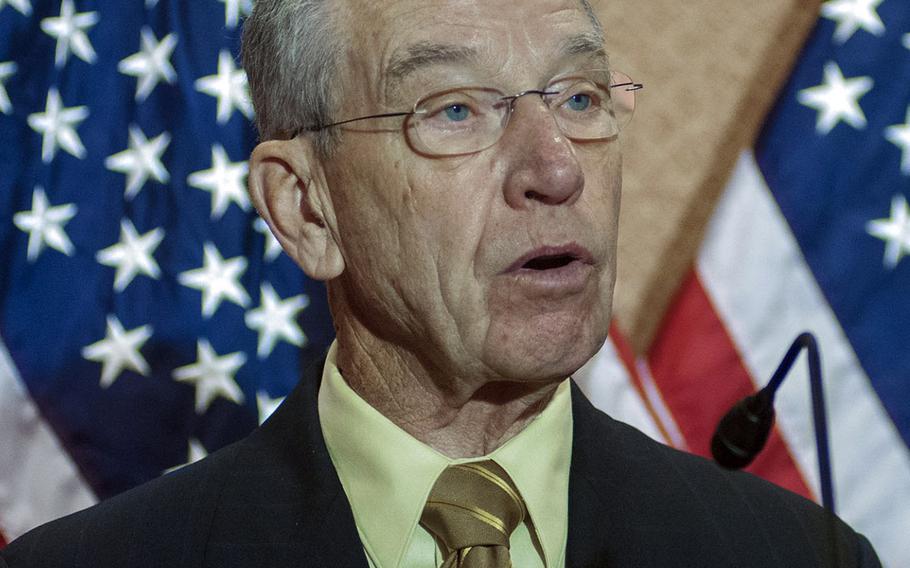
“It’s good news that Wounded Warrior Project used negative findings to try to turn itself around,” said Sen. Chuck Grassley, R-Iowa, seen here speaking at an event on Capitol Hill in December, 2014. (Carlos Bongioanni/Stars and Stripes)
WASHINGTON – A senator’s investigation into the Wounded Warrior Project after allegations of lavish spending last year has concluded that there were problems, but the organization is working to repair them.
Sen. Chuck Grassley, R-Iowa, launched his investigation in March 2016, following reports by the New York Times and CBS News of excessive spending on events and airfare and a toxic organizational culture at the charity for wounded servicemembers and veterans. The reports led to plummeting donor support and the ouster of Wounded Warrior Project’s two top executives.
Grassley, who sits on the Senate finance and judiciary committees, said he spent months pressing WWP’s board to release the information he was seeking.
In a release late Wednesday, Grassley said the organization, under Chief Executive Director Mike Linnington, has been more open about WWP’s problems – something he called a responsibility that nonprofits have to the public because they enjoy tax-free status.
“It’s good news that Wounded Warrior Project used negative findings to try to turn itself around,” Grassley said in his release. “Some high-profile charities do the opposite when confronted with problems. They hunker down instead of embracing their responsibilities to the people who are meant to benefit from their charitable mission, the donating public and the taxpayers.”
The New York Times and CBS News cited dozens of mostly anonymous former employees of the charity, who claimed it spent money on first class tickets and lavish staff gatherings, and alleged that employees and whistleblowers were reluctant to speak out fearing retaliation. The reports, which came out in January 2016, also referred to a drop in WWP’s rating on the nonprofit watchdog Charity Navigator, citing a too-high percentage of donations spent on fundraising instead of programs.
In early March 2016, the charity’s board did an external review, then instituted actions to curtail excess spending on flights or events and removed CEO Steve Nardizzi and Chief Operating Officer Al Giordano. WWP did not release findings of that review.
Grassley’s investigation looked at five areas:
Allegations that WWP was inaccurately portraying its fundraising expenses. WWP claims that donated airtime for advertising could be counted as programming. Questions about the validity of a long-running ad in which WWP said it had spent $65 million on long-term support programs. The money was placed in a trust to support veterans who need full-time care when their spouse or caregiver passes away. Concerns over the organization’s lack of transparency, particularly regarding the external review. Lack of proper tracking of costs and participation in events for veterans. In his findings, Grassley concluded that WWP had misrepresented its program spending, which he calculated as close to 68 percent. He said he is assured that the organization has changed its method of calculating the spending. He also chastised WWP for counting donated airtime as programming.
With regard to the trust, Grassley found that since the money was put into reserve rather than spent on veterans, he believed that the ad was misleading. He said the charity is no longer using the ad, but WWP “needs to better inform the public of its goals with respect to the trust.”
Calling for greater transparency, Grassley released a three-page summary and a five-page response to questions from attorney Paul Curnin, whose firm Simpson, Thacher and Bartlett conducted the independent review. That review had not been put into a written report. Grassley released it despite the document’s headline: “Confidential Treatment Requested.”
It stated that while WWP had tightened its rules on airline tickets for employees, other allegations in the initial media reports “were either false or exaggerated.” The review supported WWP’s calculations of programming expenses and found that media reports had falsely claimed that an employee retreat had a $3 million price tag. The group actually spent $1 million. The review also countered allegations that WWP did not reach out to warriors, finding that from 2013 to 2015, staff called over 150,000 veterans and sent more than 114,000 emails.
In his correspondence, Grassley inquired about WWP’s whistleblower retaliation policy, but made no findings or recommendations. Asked about it, a member of his staff said the senator found no wrongdoing.
Nardizzi, who was contacted by Stars and Stripes, said he was encouraged that the report -- while questioning some spending allocations -- debunked allegations of wild alcohol-infused parties and tens of millions spent on events.
“I think it largely vindicates the work we were doing at WWP,” Nardizzi said. “He did not find any of the things you normally see when there is an alleged scandal -- no findings of fraud or misappropriation of funding.”
cahn.dianna@stripes.com Twitter: @DiannaCahn